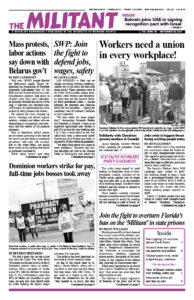Coming on the heels of last month’s pact where the governments of Israel and the United Arab Emirates formally recognized each other, the rulers in Bahrain announced they would also restore full diplomatic relations with Israel Sept. 11. Each step in this direction increases the prospect of talks by Arab governments, Israel and Palestinian groups aimed at recognition of Israel and establishing a Palestinian state.
Both accords were advanced by the U.S. administration of Donald Trump. They are tied to building a common front against the expanding influence of the regime in Iran, which is a foe of Sunni Arab governments and calls for the destruction of the state of Israel. Central to this has been pressing Arab regimes to normalize relations with Israel, after years of boycotts and publicly treating it as a pariah nation.
The Saudi monarchy, which has substantial influence over Bahraini policy, tacitly approved its decision. For now, the Saudi government says it will only establish relations with Israel after creation of a Palestinian state that includes all territory conquered and occupied by the Israeli government during the 1967 war. But the Saudi rulers ended their ban on airlines using their airspace during flights to and from Israel Sept. 10.
After signing the pact with the Israeli government, Bahrain’s King Hamad restated the need for an agreement that recognizes Israel and a Palestinian state.
Palestinian official Hanan Ashrawi Sept. 11 denounced Washington for “coercing and cajoling Arabs to normalize with Israel.” Some other Palestinian figures, like Suha Arafat, widow of longtime Palestine Liberation Organization leader Yasser Arafat, publicly supported the right of the UAE to recognize Israel.
The Palestinian Authority misleadership is increasingly isolated. Its efforts to muster opposition to the pact between Israel and the UAE fell flat at a summit of the Arab League Sept. 9. The Arab governments attending the gathering refused to approve a resolution submitted by PA officials condemning the rulers of the UAE.
At the summit Palestinian Authority Foreign Minister Riyad Malki claimed the pact was an “earthquake” shaking relations between the PA, which governs in the West Bank, and Arab governments. The Palestinian Authority and Hamas, which rules in Gaza, both defend the interests of bourgeois and upper-middle-class forces there. Both have so far rejected any talks with Israel that could bring an end to the cycle of deadly conflicts with Israeli military forces and that could open the door to establishing a Palestinian nation.
Washington says the Israeli government will suspend indefinitely any annexation of parts of the West Bank.
Mounting enmity to the Iranian rulers and their relentless drive to extend their economic, political and military reach in the Middle East is driving most other Arab governments into closer collaboration with Jerusalem. Tehran has stationed allied militias in Lebanon, Iraq and Syria in the course of intervening in wars wracking the region.
The regime in Tehran is the product of a bloody counterrevolution against the popular uprising of workers and farmers that overthrew the U.S.-backed shah in 1979. The reactionary forces who led that counterrevolution took aim at the workers, national minorities and women who the uprising brought into motion. The regime’s moves in the region today seek to extend its sway.
Israel, Serbia, Kosovo deal
Washington also helped put together a three-way deal between the governments of Israel, Serbia and Kosovo announced Sept. 4. The accord includes recognition of Israel by the rulers of Kosovo, another majority-Muslim country. It ends the Israeli rulers’ refusal to recognize Kosovo since that country declared independence from Serbia in 2008. They had previously feared doing so would undercut support for their opposition to Palestinian statehood.
These accords and the growing isolation of the PLO and Hamas, make it more likely talks will take place between Israel, Arab governments and Palestinian groups to discuss mutual recognition of both Israel and a Palestinian state.
“It is along that road that working people of all national backgrounds, religious beliefs and political allegiances in Israel and Palestine can use and defend their space to speak, organize and begin redressing the blood-drenched legacy of imperialist domination of capitalist exploitation,” Socialist Workers Party National Secretary Jack Barnes said in a 2017 statement.
Such talks must recognize “the right of Jews everywhere to take refuge in Israel in the face of the global rise of Jew-hatred and anti-Semitic violence,” Barnes said, “as well as the unconditional right of the dispossessed Palestinian people to a contiguous sovereign homeland.”
That is the road to advancing “the class interests and solidarity of workers and toiling farmers across the Middle East — be they Palestinian, Jewish, Arab, Kurdish, Turkish, Persian or otherwise.”


